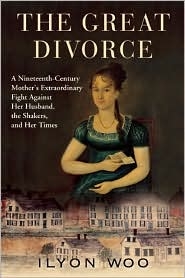
The story of Eunice Chapman is not an especially famous one. In fact, many have never even heard of her struggle against 19th century society in search of her kidnapped children. Chapman’s accomplishments, however, shook the New York State Legislature and incited ridicule, sympathy, outrage, support and even rioting. Ilyon Woo’s book, The Great Divorce: A Nineteenth-Century Mother's Extraordinary Fight against Her Husband, the Shakers, and Her Times, chronicles this dramatic story with an unbiased perspective and a flair for storytelling. In a recent lecture at Hamilton, Woo discussed her research, the process of writing a book, and the incredible account of Eunice Chapman.
After a brief introduction by Couper Librarian Randy Ericson, Woo took her audience inside Shaker society. The Shakers were an eccentric religious sect. Its membership requirements included immense personal sacrifice, such as a loss of personal identity, complete devotion to the Shaker lifestyle and strict chastity. Despite the bleakness and rigor of Shaker life, the sect offered women an equal place in society and a much-wanted alternative to life as a housekeeper with few rights. They were a peaceful and tight-knit group, which made Chapman’s case even more shocking.
Eunice Chapman’s husband, James Chapman, was an unreliable alcoholic who abandoned his wife and three children and later came across the Shaker religion. The Shakers welcomed James and he found the strength to overcome his addiction and return home. However, when Eunice refused to move to a Shaker village with James and the children, James fled once again, though this time along with the children. The next few years of Eunice’s life were dedicated to getting her children back by any means necessary. Her emotional pleas engrossed the public, her frightening threats made Shaker leaders take notice, and her logical mind appealed to government officials.
As a woman, her case was considered to be shameful and dishonorable. In that time, the only grounds for a legal divorce were well-proven adultery, and a man could do as he pleased with his children as the head of household. Because of this social structure, Chapman was widely ridiculed and made to look like a lunatic for her attempt at divorce. Some claimed the case would embolden other women to rebel against their circumstances. These detractors demanded a speedy dismissal of the case. Even Thomas Jefferson objected to Chapman’s allegedly vulgar behavior.
Ultimately, Chapman won her case. She was the first and only woman of her time to be granted a legal divorce and custody over her children in the absence of adultery. As Woo explained, Chapman “convinced [the legislature] to give the unthinkable.” Her real fight, on the other hand, was not yet finished, as she was still unaware of where the Shakers were hiding her children. After much searching, she discovered their whereabouts in a New Hampshire Shaker village. After a dramatic night that nearly escalated into violence, Eunice was finally reunited with her children.
The story is far from one-sided, however, and Woo’s lecture included excerpts from James’ letters and Shaker manuscripts, an original of which lay on the table in front of her. The book came from Hamilton’s own library, which boasts an impressive collection of Shaker works. In addition to Chapman’s remarkable story, Woo also discussed the thrills and frustration of the research process, describing one occasion on which she dug tediously through 26 boxes of legal documents with very little to show for it and contrasting it with “eureka moments” when “you know you have a book.”
Because of limited documentation on Shaker culture, the author emphasized the difficulties associated with Shaker research and the unique advantage that Hamilton has due its extensive assortment of Shaker books and artifacts. Many of these were donated by Walter Brumm, whose generosity to Hamilton’s library could theoretically have seriously shortened the 12 years Woo spent on research for The Great Divorce. As Woo herself put it, visiting Hamilton felt like being “a kid in a candy store.”
Posted April 15, 2011
